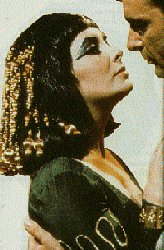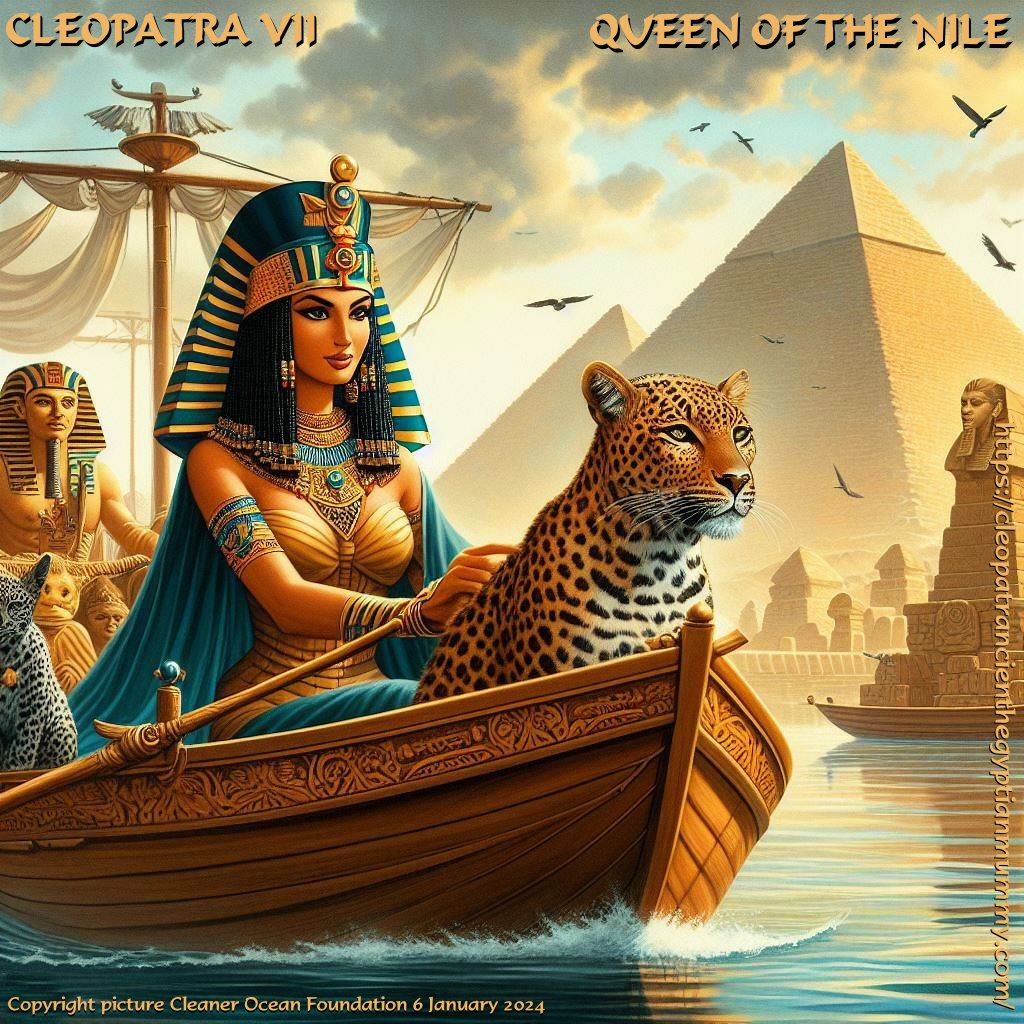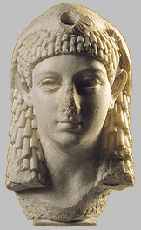|

It
was not Cleopatra's beauty in
itself was so striking that it stunned the onlooker, but the
inescapable impression produced by daily contact with her:
the attractiveness in the persuasiveness of her talk, and
the character that surrounded her conversation was
stimulating. It was a pleasure to hear the sound of her
voice, and she tuned her tongue like a many-stringed
instrument expertly to whatever language she chose.

Elizabeth
Taylor as Cleopatra
Cleopatra
VII was born in 69 BC in Alexandria, which was then the
capital of Egypt. Her father was Egypt's pharaoh, Ptolemy
XII, nicknamed Auletes or "Flute-Player."
Cleopatra's mother was probably Auletes's sister, Cleopatra
V Tryphaena. (It was commonplace for members of the
Ptolemaic dynasty to marry their siblings.)
There
was another Cleopatra in the family - Cleopatra VII's elder
sister, Cleopatra VI. Cleopatra VII also had an older sister
named Berenice; a younger sister, Arsinoe; and two younger
brothers, both called Ptolemy. The family was not truly
Egyptian, but Macedonian. They were descended from Ptolemy
I, a general of Alexander the Great who became king of Egypt
after Alexander's death in 323 BC.
When
Cleopatra VII ascended the Egyptian throne, she was only
seventeen. She reigned as Queen Philopator and Pharaoh
between 51 and 30 BC, and died at the age of 39.
Cleopatra was Macedonian, but despite her ancestry, she was worshipped as a god.
Queen
of the Nile.

The
demise of the Ptolemies
power coincided with the rise of the Roman
Empire. Having
little choice, and seeing city after the other falling into
Rome's grip, the Ptolemies decided to ally with the Romans,
a pact that lasted for two centuries. During the rule of the
later Ptolemies, Rome gained more and more power over Egypt,
and was even declared guardian of the Ptolemaic Dynasty.
Cleopatra's father, Ptolemy XII had to pay tribute to the
Romans to keep them away from his Kingdom. Upon his death,
the fall of the Dynasty seemed even closer.
Hence
the controversy over Cleopatra's real motives. Was she
trying to save her throne, or did she have a more
noble cause? Was she protecting her Dynasty, or was she
preventing more interference from the Romans in Egypt?
As
children, Cleopatra and her siblings wittnessed the defeat
of their guardian, Pompey, by Julius
Caesar in a duel. Meanwhile, Cleopatra and her
brother/husband Ptolemy XIII were duelling, albeit silently,
over the throne.
In
the middle of all this turmoil, Julius Caesar left Rome for
Alexandria in 48 BC. During his stay in the Palace, he
received the most famous gift in history: an oriental
carpet... with a 22 year old Cleopatra wrapped in. She
counted on Caesar's support to alienate Ptolemy XIII. With
the arrival of Roman reinforcements, and after a few battles
in Alexandria, Ptolemy XIII was defeated and killed.
In
the summer of 47 BC, having married her younger brother
Ptolemy XIV, Cleopatra and Caesar embarked for a two month
on a trip along the Nile, aboard a legendary
boat. Together,
they visited Dendara, where Cleoptara was being worshipped
as Pharaoh, an honor beyond Caesar's reach. They became
lovers, and indeed, she bore him a son, Caesarion. In 45 BC,
Cleopatra and Caesarion left Alexandria for Rome, where they
stayed in a palace built by Caesar in their honor.

Bust of Cleopatra
Caesar's
acts were anything but overlooked by the Romans. In 44 BC,
he was killed in a conspiracy by his Senators. With his
death, Rome split between supporters of Mark
Antony and Octavian. Cleopatra was watching in silence,
and when Mark Antony seemed to prevail, she supported him
and, shortly after, they too became lovers.
Mark
Antony's alliance with Cleopatra angried Rome even more. The
senators called her a sorceress, and accused her of all
sorts of evil. The Romans became even more furious as Antony
was giving away parts of their Empire - Tarsus, Cyrene,
Crete, Cyprus, and Palestine - one after the other to
Cleopatra and her children.
It
was the boiling point when Octavian declared war on
Cleopatra, and off the coast of Greece in the
Adriatic Sea
they met in one of the most famous battles in history: Actium. The Egyptian defeat was often attributed to the
early withdrawal of a coward Cleopatra from the
battle scene, although this claim is now discredited by most
historians.
Cleopatra's
tomb is still lost in time
Octavian
waited for a year before he claimed Egypt as a Roman
province. He arrived in Alexandria and easily defeated Mark
Antony outside the city, near present day Camp César.
Antony was asked to be taken to Cleopatra. He died in her
arms and was buried as a King.
Octavian
entered Alexandria in 30 BC. Cleopatra was captured and
taken to him, and the Roman Emperor had no interest in any
relation, reconciliation, or even negotiation with the
Egyptian Queen. Realizing that her end is close, she decided
to put an end to her life. It is not known for sure how she
killed herself, but many believe she used an asp as her
death instrument.
With
the death of Cleopatra, a whole era in Egyptian history was
closed. Alexandria remained capital of Egypt, but Egypt was
now a Roman province. The age of Egyptian Monarchs gave way
to the age of Roman Emperors, and Cleopatra's death gave way
to the rise of Rome. The Ptolemies were of Macedonian
descent, yet they ruled Egypt as Egyptians - as Pharaohs.
And, indeed, Cleopatra was the last Pharaoh.

Cleopatra
was the last pharaoh of Egypt.
Cleopatra
VII Philopator (Ancient Greek:
Κλεοπάτρα
Φιλοπάτωρ; Late 69 B.C.E.
– August 12, 30 B.C.E.), known to history as Cleopatra, was the last
pharaoh of Ancient
Egypt.
She was a member of the Ptolemaic dynasty, a family of Greek origin
that ruled Egypt after Alexander the
Great's death during the
Hellenistic period. The Ptolemies, throughout their dynasty, spoke
Greek and refused to speak Egyptian, which is the reason that Greek as
well as Egyptian languages were used on official court documents such
as the Rosetta Stone. By contrast, Cleopatra did learn to speak
Egyptian and represented herself as the reincarnation of an Egyptian
goddess, Isis.
Cleopatra originally ruled jointly with her father Ptolemy XII Auletes
and later with her brothers, Ptolemy XIII and Ptolemy XIV, whom she
married as per Egyptian custom, but eventually she became sole ruler.
As pharaoh, she consummated a liaison with Julius Caesar that
solidified her grip on the throne. She later elevated her son with
Caesar, Caesarion, to co-ruler in name.

After Caesar's assassination in 44 B.C.E., she aligned with Mark
Antony in opposition to Caesar's legal heir, Gaius Julius Caesar
Octavianus (later known as Augustus). With Antony, she bore the twins
Cleopatra Selene II and Alexander Helios, and another son, Ptolemy
Philadelphus. Her unions with her brothers produced no children. After
losing the Battle of Actium to Octavian's forces, Antony committed
suicide. Cleopatra followed suit, according to tradition killing
herself by means of an asp bite on August 12, 30 B.C.E.. She was
briefly outlived by Caesarion, who was declared pharaoh by his
supporters, but he was soon killed on Octavian's orders. Egypt became
the Roman province of Aegyptus.
|
CLEOPATRA THE MUMMY
REBORN
INDEX
TO SCRIPT SCENES V 2.0
|

CHAPTERS:
The chapters of this story are published live for collaboration development
purposes, using the
Chapters below, supplemented with other (as yet unpublished) writings as we
progress. The final order for the proposed screenplay may be the subject of
additional drafts to suit production of a final movie
(producers/directors/actors) or network adaptation. Using this outline,
studios should be in a position to gain an idea of style
and commercial value, please request a copy of our Kulo-Luna (draft)
screenplay. See our terms and conditions. The script version of these
Chapters will not be published mainstream as a novel for a suitable period, but will be available
(as with Kulo-Luna),
also lodged with the British Library. Including this and other associated
websites.
Please
note, this is the Index page for the revised Plot V 2.0 script focused
on Cleo's preparations for the afterlife as written below, and working
towards a comic
script adaptation using the tools in Final
Draft. The initial scene sequence (derived from Book
Chapters) is in the process of being subdivided and re-sequence for May
2025 target. The Final Draft is sure to be in a very different order, to add
a little spice for readers and viewers. Though the original content and
concept remain the same.
ANGEL
OF DEATH - Anubis and Isis occupy Josef Mengele's and Adolf Hitler's
subconscious as spirits steering their legacies.
WWII
ENIGMA - The birth of computers at Bletchley Park under Alan Turing,
code breakers, the Colossus and Adolf Hitler's Enigma
INNER
CIRCLE OF SIX - Nazi funded medical human research laboratories. Joseph
Mengele's backup plan for a Fourth Reich, to be structured by selected
escaped scientists, with relocation to Brazil, as a reserve plan if it looks
as though Germany might lose World War Two.
BRAZIL
BOUND - Doctor Death bargains for funding and logistics of relocation to
Amazon South American base via Argentina.
THE
BATTLE OF ACTIUM - Queen Cleopatra retreats leaving Mark Antony to lose
against Octavian and seek a new deal with Rome.
THE
POISON
ASP - Alexandria, the site of Cleopatra’s palace, where she entertained
Julius Caesar and Marcus Antonius
(Mark Antony), two of the most prominent Roman generals in ancient
history, the queen sought refuge in her mausoleum, and grief stricken, took
her own life, having
brokered a pact with Anubis and Isis for protection in the Afterlife. This signaled the end of the Hellenistic
(Ptolemaic) dynasty in 30 BC, with the combined suicide of
Mark Antony and Cleopatra, following their defeat at the naval Battle of
Actium. WRATH OF THE GODS -
The destruction of
Thonis, sinking of the
civilization by earthquake & tsunami, C. 600 AD. NEW WORLD ORDER - A Neo-Nazi plan to regenerate Aryan supremacy, is led by Baron
Richthofen (Nazi occultist), working with Rudolf
Kessler, a German archaeologist specializing in Egyptology, and Klaus
von Kolreuter, a Swiss DNA expert. THE
AFTERLIFE - Cleopatra's
tomb lay lost for centuries submerged and out of sight with
little change of discovery. REBEL
WITHOUT A CAUSE - Having reached the end of his PhD, William and Jane
Bates have epiphanies, Will should follow his dream ROADBLOCK
- Nobody would fund his R&D, William and Jane Bates are blanked by DARPA,
computer and software houses QUANTUM
LEAP - Jane and Will find backers, then US military and computer
processor chip makers cyber attack, hack and bug them EXIT
STRATEGY - Realising they will always be a target from industrial and
military espionage, Jane & Will devise a cunning plan CYBERCORE
GENETICA - Nano computer technology is purchased at an auction by a
religious sect, aiming to resurrect the last Queen of
Egypt. WASHING
MACHINE - Inventor Franco Francisco comes up with the Incubus, artificial
uterus concept while repairing his household appliance PATENT
APPLICATION - Franco Francisco files his Claims with the Italian
Intellectual Property Office (IPO) in Roma, Italia INCUBUS - Italian scientist
Franco Francisco had been perfecting his art, cloning large
mammals, then finally managed to nurse a human embryo to fetus and birth
with amazing results. He
was watched closely by the religious Neo Nazi cartel, having published a paper on the
possibility of digital reincarnation.
SPLICE
- Klaus von Kolreuter perfects his
DNA manipulation genome sequencing
at Genomino Investments, Geneva, together with brain conditioning system.
TREMORS - Cleopatra's
tomb lay lost for centuries. Then one day a shift in the tectonic
plates triggered a tremor off the coast of Alexandria.
PANAMANIAN
RUNNING MAN - Sam Hollis investigates a youtube video uploaded by
Marjorie Boyle, showing the world's faster human runner.
MAJORIE
BOYLE - Sam Hollis tracks down sexy backpacker, Majorie Boyle, to Brighton Point in
Trinidad, beautiful Caribbean Island
THE
ARK - NeuWelt
Rittertum headhunt John Storm seeking access to his genetic DNA map of
life on earth, but they fail to reach agreement
THE AMAZON -
Charley Temple
agrees to meet John Storm as to disturbing
technology she had discovered in a village on the banks of
the Amazon, that engineers enhanced humans. Storm is an
amateur archaeologist, who has amassed a sizeable DNA
collection that is stored onboard the amazing 'Elizabeth
Swann.' An autonomous vessel powered by renewable energy,
with onboard AI to assist the crew on their adventures. he
is keen to find out more. OPERATION
LEVIATHAN - New World Knights, Klaus and Franco go to Plan 'B' to track
and steal the Elizabeth Swann & The Ark DNA database TOMB
RAIDERS - Safiya
Sabuka tracks down Ahmed
Saleh and persuades him to reveal where he found an ivory comb that
could only have come from Cleopatra's mausoleum.
SCOTLAND
YARD - A
US contingent headed by Jack Mason (CIA) had been shadowing the German
fanatics with the Egyptian secret service, as they take more
than a passing interest in these revelations, they
realise the implications. Mason is also liaising with Scotland
Yard who shared an expansive DNA
database, with the Ministry of Defence, DARPA and Interpol.
OPERATION ALEXANDRIA -
Safiya Sabuka, Musa
Bomani and Panama,
dive Ahmed Saleh's
location & recover Cleopatra's
sarcophagus from a watery grave.
SALVAGE
RIGHTS - Entering Cleopatra's mausoleum, locating sarcophagus and raising
with air bags to the surface, Safiya Sabuka tomb raider.
COASTGUARD
PATROL - Safiya and Musa surface off Alexandria to a waiting customs vessel,
they pretend to be sports divers fooling the officials
SARCOPHAGUS
OPENING - The wooden inner casket is opened revealing Cleopatra's mummy,
golden crown and death mask, perfectly preserved
KIDNAP - Charley is taken prisoner while
investigating a former Nazi lair near Manaus. John
Storm and Dan Hawk rescue her and discover human enhancing technology, which
Dan gets to work on understanding, using John as the subject, after he is
injected with a CRISPR
virus during a fight.
UNESCO - Fearing heritage
theft, asks agencies for help. Interpol issue Red Notice. Blue Shield enlist John
Storm, as an expert on anthropological DNA, via Jack
Mason, CIA coordinator.
AWAKENING
- In the afterlife, the DNA extracted from Cleopatra's mummy triggers a
divine stirring with Anubis and Isis comforting the Nile Queen
REPLICANT - The Society reproduce Cleopatra using Francisco's
RepliVator™, uploading synapse sequence and implanted memories.
BRAIN
CONDITIONING - Klaus and Franco upload digitally recreated memories in
historical order to trigger correct learned synapse firing sequence
REBORN
- The former Queen of Egypt speaks for the first time to her creators,
proving that her brain is working, the implants succeeded
FULL STEAM AHEAD - Storm speeds to
Thonis, then uses the Swann's AI
sensors and the Ark
database to find tomb has been plundered.
PROPOSAL
- Baron von Richhofen's gambit, a union of Royal ancient and Aryan blood,
for strength and intellect, a powerful heir as her successor
RITUAL SACRIFICE - The Baron prepares a drugged Cleopatra for ceremonial
impregnation.
MANAUS
TO ALEXANDRIA - A hydrogen powered race across the Atlantic Ocean in
nine days, John Storm guided by Anubis and Isis
SANCTUM
INTERRUPTUS - John finds hidden chamber near Alexandria,
disturbs ritual joining, arresting conspirators, though Baron
escapes.
THE CHOSEN ONE - The reincarnated Cleopatra falls for John Storm, the
image of Marcus
Antonius. John comes under her spell.
MOVIES,
WHAT ARE THEY - Reincarnated Nile Queen asks John and Dan to explain
films, they show her 20th
C. Fox 1963 Elizabeth Taylor biopic.
MEDITERRANEAN
CRUISE - John suggest a tour of the Wadj Ur, Thalassa Nostrum, to relax
Cleopatra, Hal plans the ultimate experience
JOHN'S
BLOODLINE - Dan and Hal trace trace John's noble lineage back to the iconic figures of Ancient Egypt
& Roman General Mark Antony
MEDICAL
EXAMINATION - Jack Mason talks John and Cleopatra into agreeing to a
check up at Port Royal, Jamaica, working for NSA and CIA
GEORGE
WARNS OF TORTURE - Franks radios Swann to tell John & Dan that New
World Knights are being tortured at Guantánamo Bay, you're next
JESUS
CHRIST - Cleopatra asks about this man. John, Dan & Hal explain he
is an ancient religious preacher from Galilee, son of Yahweh, Hebrew god
BIOCORE
BRAIN IMPLANT - Dan and Cleopatra drill John's skull, occipital
bone implanting biological chip to interface with CyberCore Genetica
DARPA,
NSA & CIA - National security and military intelligence chiefs Iras
Charmian and Dr Stefan Raengst, plot to remove all human obstacles
MILITARY
INTERVENTION - US military detain Cleopatra as security threat, despite media and medical protests. Storm is distraught.
BATTLE
ARMOUR - With some unexplained divine intervention, Dan Hawk talks John
Storm into wearing a bullet proof suit.
GUANTÁNAMO
BAY - History repeats itself.
DNA digitally enhanced John rescues Cleopatra from Guantánamo Bay, CIA try
to sink Swann.
MISSION
IMPOSSIBLE - Commander John Storm, in Navy SEAL mode, attacks the Cuban
torture camp at Guantánamo Bay, in stealth mode, black op.
MISSILE
LOCK - USA military try to hack into Hal, anticipating a strike, as the DOD
launch Tomahawks, John hacks into NORAD, and redirects them.
PRESIDENT
LINCOLN TRUMAN - Hails the Swann to find out why John is shooting missiles
at Guantánamo Bay, Storm sets the record straight. FINALE
|
|

A
FRESH START -
Cleopatra led a fraught life, fighting her corner in difficult times.
The stress proved too much for the beleaguered queen of Egypt, leading
her to take her own life, rather then be paraded around like her sister
Arsinoe IV. When she is brought back to life some 2,000 years later, as
the world's first time traveler, she is given a second chance to find happiness
and help the world heal their political divisions against a common
enemy; the kleptocratic ambitions of many world leaders - that will ruin
the planet and kill much of the animal kingdom, if left unchecked.

JOHN
STORM
is captain of the
Elizabeth Swann, a solar and hydrogen powered craft, that he likes
to
race occasionally. The Elizabeth Swann is not only swift, but superbly
equipped for scientific and ocean conservation tasks, such as
archaeological surveys. The vessel also houses John's prized DNA
archive, called The
Ark, a useful reference tool. The vessel is an
ongoing real life design study. The Foundation has a shipbuilder ready
to construct the craft as per the illustration above, for film work, for
ocean survey and more.
|
|
|
To this day, Cleopatra remains a popular figure in Western culture.
Her legacy survives in numerous works of art and the many
dramatizations of her story in literature and other media, including
William Shakespeare's tragedy Antony and
Cleopatra, Jules Massenet's
opera Cléopâtre and the film Cleopatra (1963). In most depictions,
Cleopatra is portrayed as a great beauty, and her successive conquests
of the world's most powerful men are taken as proof of her aesthetic
and sexual appeal. In his Pensées, philosopher Blaise Pascal
contends, evidently speaking ironically because a large nose has
symbolized dominance in different periods of history, that Cleopatra's
classically beautiful profile changed world history: "Cleopatra's
nose, had it been shorter, the whole face of the world would have been
changed."


Queen
Cleopatra's royal barge, last of the Pharoahs

Egyptian boat building - Khufu's royal barge - solar boat for the afterlife
LINKS:

ANCIENT
EGYPTIAN PYRAMIDS |
CAT
GODDESSES LINKS
|
CAT MUMMIES
| CLEOPATRA
QUEEN OF EGYPT |
CLEOPATRA
PHARAOH
GIZA
| JULIUS
CAESAR
| PHARAOHS
| PYRAMIDS
| RA - SUN
GOD |
SOLAR BOAT
| SOLAR
BOAT
|







